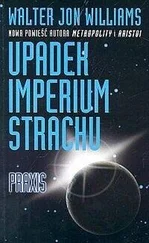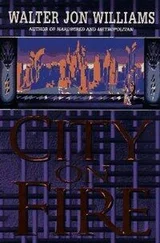Walter Williams - The Rift
Здесь есть возможность читать онлайн «Walter Williams - The Rift» весь текст электронной книги совершенно бесплатно (целиком полную версию без сокращений). В некоторых случаях можно слушать аудио, скачать через торрент в формате fb2 и присутствует краткое содержание. Год выпуска: 2013, Издательство: Baen Books, Жанр: Фантастика и фэнтези, на английском языке. Описание произведения, (предисловие) а так же отзывы посетителей доступны на портале библиотеки ЛибКат.
- Название:The Rift
- Автор:
- Издательство:Baen Books
- Жанр:
- Год:2013
- ISBN:нет данных
- Рейтинг книги:3 / 5. Голосов: 1
-
Избранное:Добавить в избранное
- Отзывы:
-
Ваша оценка:
- 60
- 1
- 2
- 3
- 4
- 5
The Rift: краткое содержание, описание и аннотация
Предлагаем к чтению аннотацию, описание, краткое содержание или предисловие (зависит от того, что написал сам автор книги «The Rift»). Если вы не нашли необходимую информацию о книге — напишите в комментариях, мы постараемся отыскать её.
The Rift — читать онлайн бесплатно полную книгу (весь текст) целиком
Ниже представлен текст книги, разбитый по страницам. Система сохранения места последней прочитанной страницы, позволяет с удобством читать онлайн бесплатно книгу «The Rift», без необходимости каждый раз заново искать на чём Вы остановились. Поставьте закладку, и сможете в любой момент перейти на страницу, на которой закончили чтение.
Интервал:
Закладка:
Stan rose slowly from the sofa, took a few steps, then hesitated. “I can’t decide,” he said.
The President took his seat behind the massive desk. “Decide what, Stan?” he said.
Stan looked at him blankly. “I can’t decide if you’re crazy or not,” he said.
The President gazed at the papers in front of him. “I’m doing my job, Stan. And if I stop doing my job, I have lots of bright young folks like you to tell me.”
Stan licked his lips. “Yes, Mr. President.”
“It’s much easier when you don’t care. Really it is.”
“Yes, sir.”
“You should try it sometime.”
Stan left the Oval Office in silence. The President frowned at his paperwork for a moment, and then his glance rose to the photograph of the First Lady that sat on a corner of the broad desk. A knife of grief suddenly twisted in his heart, a pain so pure and exquisite that it took his breath away. For a moment tears spilled down his face.
Then the moment passed, and all was tranquil again. It was much better this way, the President thought as he wiped his face. Much, much better.
*
Jason could breathe again. This was the good news.
The bad news was that his journey was over. When he left the Army-run refugee camp near Vicksburg, it would be to join his family, his father in California or his aunt in New York State. He would return to a human environment that was in its essence intact, that nestled in comfortable dominion over Nature, a world that had not been destroyed and ravaged and remade, like the Mississippi Delta. Like himself.
The world to which he would be called seemed alien and strange, its comforts false, its reassurance suspect. It seemed to him that the life of the refugee was somehow more genuine than any other form of existence. It seemed to him now that, whether he knew it or not, he had always been a refugee, thrown like a chip into the Mississippi, carried by accident and destiny down its broad, brown expanse.
It seemed to him that everyone was a refugee, if they only knew it.
The deputy’s bullet had broken three ribs and burrowed a long, erratic path along the large muscles of his back. Neither the bullet nor the broken ribs had punctured a lung- his breathlessness was a result of a wrecked rib cage and trauma, not internal hemorrhage. Once he’d had his ribs strapped he was able to breathe again- strange how a tight bandage permitted breath rather than restricted it. Drugs had eased the pain and swelling of his torn back muscles.
The presence of Arlette had healed him faster than any drug. The breath he drew from her lips was sweeter than any air he had known. With his ribs strapped, he could walk with Arlette about the encampment, along the lanes between the ruler-straight Army tents where refugees lived with their families.
Now that the journey was over, Arlette wore her birthday presents all the time. Diamonds glittered in her ears, in the little golden lily in the hollow of her throat. And in her pocket she carried her grandfather’s watch.
Jason knew he had at most only a few days to enjoy his time with Arlette before he was shipped out. The Mississippi had relinquished control of his life, but that did not mean he was free. It meant he was now controlled by adults, adults whose decrees, so far as he was concerned, were as arbitrary and implacable as those of Nature.
Bright green wings flashed overhead, and Jason looked up to see a parrot perch on a nearby awning. In the chaos of the earthquakes and evacuations, the parrot had been set free. It had been living in the vicinity of the refugee camp for as long as Jason had been there. Some of the refugees had tried to catch the bird, but thus far it had evaded them.
“What will you do now?” Jason asked. “You and your mom, I mean.” His throat was still swollen, and he still needed to tilt his head to speak without pain.
“I don’t know,” Arlette said. “I don’t think she knows, yet. The house in Toussaint is all right, so far as we can tell, but the country is still flooded, and will be flooded for weeks, and there isn’t any way to get there unless we can use a helicopter.” She touched the pocket where her Gros-Papa’s watch rested. “And- well, it’s not nice there right now.”
Jason took her hand and squeezed it. “I wish we could stay together. Maybe I can talk to my dad, to Aunt Stacy, to someone …” He looked up. “Oh, my gosh,” he said.
His father was walking toward him, striding down the lanes between tents. He wore khakis and a Dodgers cap and a button-down shirt with a sky-blue tie, which was his idea of casual dress. But Frank Adams wasn’t alone: a whole mob trailed behind him, at least two television cameramen, a pair of skinny bearded men with microphones on long booms, a blond-helmeted reporter picking her way in high heels and short skirt past the refugees and their clutter.
Jason was stunned. He stood rooted to the spot while his father came close to him and threw his arms around him. “Careful!” Arlette yelped, wary of his broken ribs. But Frank didn’t put much strength into his hug.
“Hello, son,” Frank said. “Surprised to see me?”
Jason looked at the cameras. He could see the lenses focusing on him, zooming in for the closeup. “Who are these people?” he asked. Pain knifed through his throat, and he winced.
The blond reporter quickly explained that they were from a television news program- Jason recognized the name, a tabloid show so consistently sordid that his mother automatically shifted stations to avoid it- and they had flown his father into the camp on their helicopter so that he and Jason could be reunited.
Jason tilted his head to speak. “Great,” Jason said.
The reporter asked him how he felt now that he and his father were together.
“Great,” said Jason.
Jason saw out of the corner of his eye that the camera crew were jostling Arlette away, and he reached for her arm and pulled her closer.
“Dad,” he said, “this is my girlfriend, Arlette.”
Frank seemed a little taken aback- not because Arlette was black, Jason assumed, since a man married to a half-Chinese scarcely had any room to object- more likely Arlette’s existence was a complication he’d never suspected. After a moment’s hesitation, he shook Arlette’s hand.
“Nice to meet you, Arlette,” he said.
“Sir,” said Arlette.
The reporter asked if Jason and Arlette had met in the camp.
“The camp in Rails Bluff,” Jason said.
The reporter asked more questions, starting from Rails Bluff and going on from there. Jason answered the questions in as few words as possible. He had spoken to reporters before- the camp was infested with them- and this interview was much like the others. He had the impression that his answers didn’t matter, that the reporter had decided in advance what his answers were going to be, and asked questions calculated to get the answers she wanted.
The reporter asked Jason if he thought of himself as a hero.
“No,” he said.
Then the reporter asked Arlette if Jason was a hero.
“Yes,” Arlette said, and a rocket of pleasure soared up Jason’s spine.
The reporter asked Jason what he wanted to be when he grew up. “An astronomer.” he said, which got a surprised look from Frank.
Jason didn’t know whether he wanted to be an astronomer or not, not really. But he knew he still had a few issues with the cosmos, and thought maybe astronomy would help him think about them.
“Excuse me,” Jason said. “But I’ve got to go to the infirmary. The doctors wanted to see me about my-” His hands made scratching motions near his waist. “About my broken ribs.”
Jason made his escape to the infirmary tent, where he had a cot and where reporters weren’t allowed. Frank and Arlette followed. Jason turned to his father.
Читать дальшеИнтервал:
Закладка:
Похожие книги на «The Rift»
Представляем Вашему вниманию похожие книги на «The Rift» списком для выбора. Мы отобрали схожую по названию и смыслу литературу в надежде предоставить читателям больше вариантов отыскать новые, интересные, ещё непрочитанные произведения.
Обсуждение, отзывы о книге «The Rift» и просто собственные мнения читателей. Оставьте ваши комментарии, напишите, что Вы думаете о произведении, его смысле или главных героях. Укажите что конкретно понравилось, а что нет, и почему Вы так считаете.











